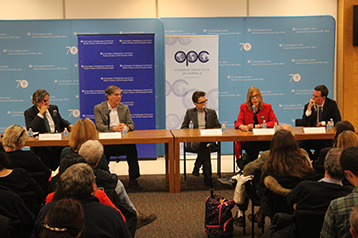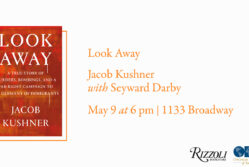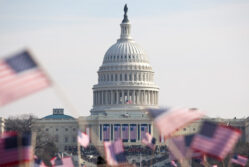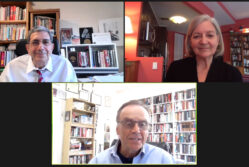Event Coverage Highlight

Experts Draw Crowd for Panel on U.S. Election Hacks

Left to right: Alexander Cooley, Will Englund, Masha Gessen, Kimberly Marten, and Paul Sonne. Photo: Chad Bouchard
By Chad Bouchard
A standing-room crowd of more than 170 gathered at the Harriman Institute on Jan. 18 to hear thoughts from Russia experts about the uncertain relationship between Russian President Vladimir Putin and U.S. President Donald Trump, the impact of Russian hackers on the U.S. presidential election, and the future of a shifting world order.
The event, co-sponsored by the OPC, the Harriman Institute and Columbia University’s Graduate School of Journalism, was held just two days before U.S. president Donald Trump’s inauguration, and on the heels of a CIA Open Source division report on Jan. 9 strongly suggesting Russian interference in the election.
The declassified report concluded – with high confidence – that Putin had ordered an “influence campaign” to help Trump win the election.
Masha Gessen, author of The Man Without a Face: The Unlikely Rise of Vladimir Putin and other books, was not convinced the CIA showed strong evidence to support its conclusions, saying the connection is thin between Russia’s hacking of the Democratic National Committee and the country’s direct influence on the election outcome.
“I’m surprised that we’re at a point where legacy media pick up products of illegal actions without debate,” she said, citing New York Times coverage of the story. “I mean they ran with the WikiLeaks publications the day after they appeared. The argument that’s being made by the report of the intelligence agencies is that it was RT that played a key role. It would be quite difficult to argue that Russia influenced the American election by using the New York Times.” RT, or Russia Today, is an international news channel funded by the Russian government.
Will Englund, Asia and Russia editor on The Washington Post’s foreign desk, agreed that it is difficult to know how much impact the hacking really had.
“It may have helped to feed the scandal a little bit. [Hillary Clinton] did get nearly three million more votes than Trump did, so how can you say what motivated the 70,000 people in the three states that made the difference?” he said, adding that rumors of Russian influence “helps toshake things up a little bit, perhaps cast doubt on the legitimacy of the election the sanctity of the election. Perhaps that was really the intention.”
Englund served three tours as a Moscow correspondent, two for the Baltimore Sun and one for the Post, from 2010 to 2014, and was one of three co-recipients of the 1997 Whitman Bassow Award at the Sun for their “The Shipbreakers,” a series about U.S. Navy scrapping programs overseas.
Kimberly Marten, director the U.S.-Russia relations program at Harriman, said Russia had tried many times to influence Western elections, with “singularly unsuccessful” results.
“Maybe [Putin] actually blew it,” she said, “because the intervention was so ham-handed that it was easy for CrowdStrike to figure out what was going on. He never intended to have this made as public as it was.”
CrowdStrike is the private firm that identified the fingerprints of Russian hackers in the leaks.
Paul Sonne, Pentagon correspondent for The Wall Street Journal, said U.S. intelligence agencies could be reluctant to disclose how they arrived at conclusions about the influence for fear of putting sources at risk.
“The flip side of the argument is that they don’t have the goods,” he said. “So then we’re in this tricky position of being asked to simply believe in the conclusion of this great American institution at a time when we are probably in one of the greatest crises of faith in institutions in America.”
Sonne writes about national security and was the Journal’s Moscow correspondent from 2013 to 2016. He was the OPC Foundation’s 2008 Stan Swinton scholar and served as intern in AP’s Moscow bureau. He was also part of a Wall Street Journal team that won the OPC’s 2011 Malcolm Forbes Award for “Censorship Inc.,” a series of articles on how Western and Chinese tech companies enabled Iran, Egypt, Libya and Syria to spy on dissidents.



